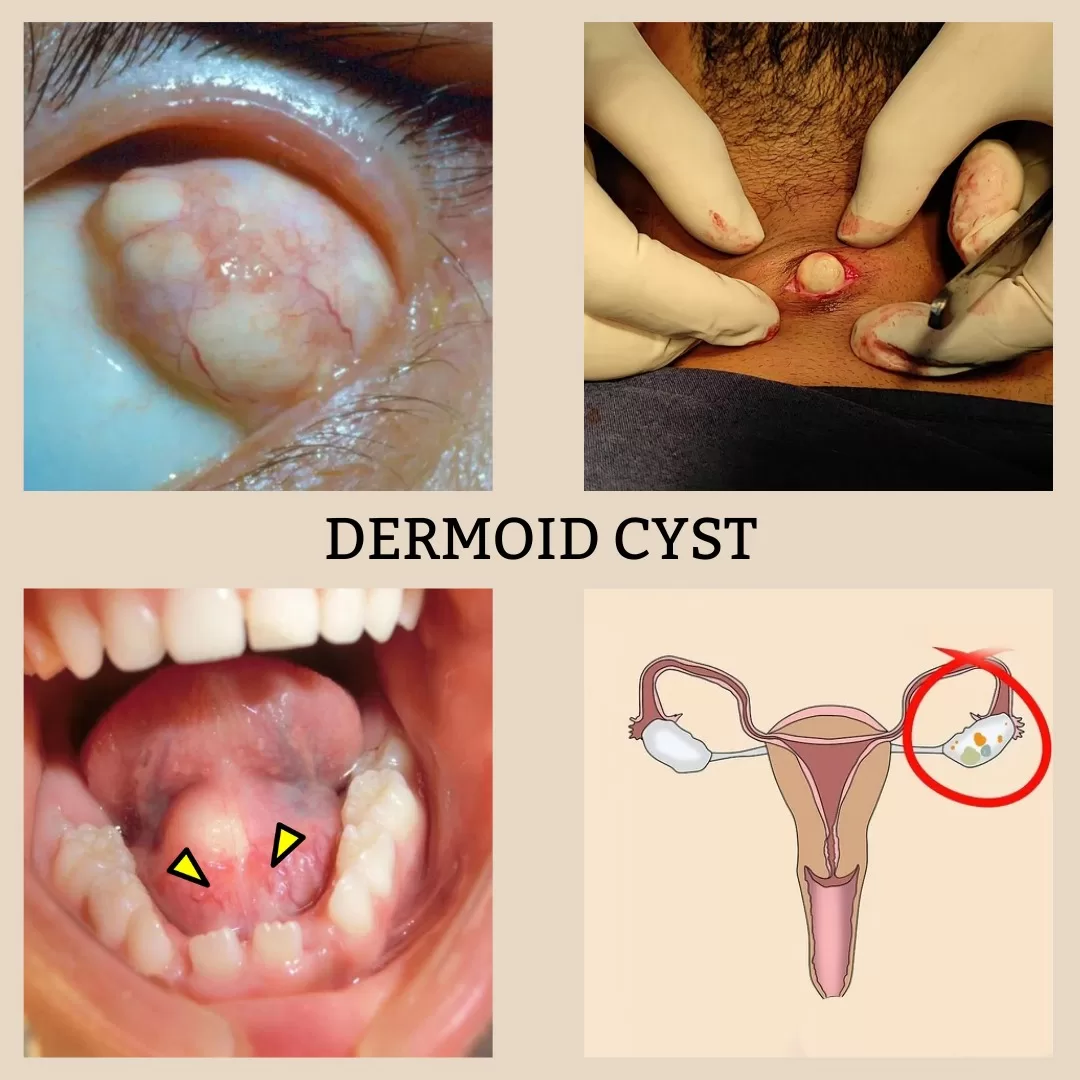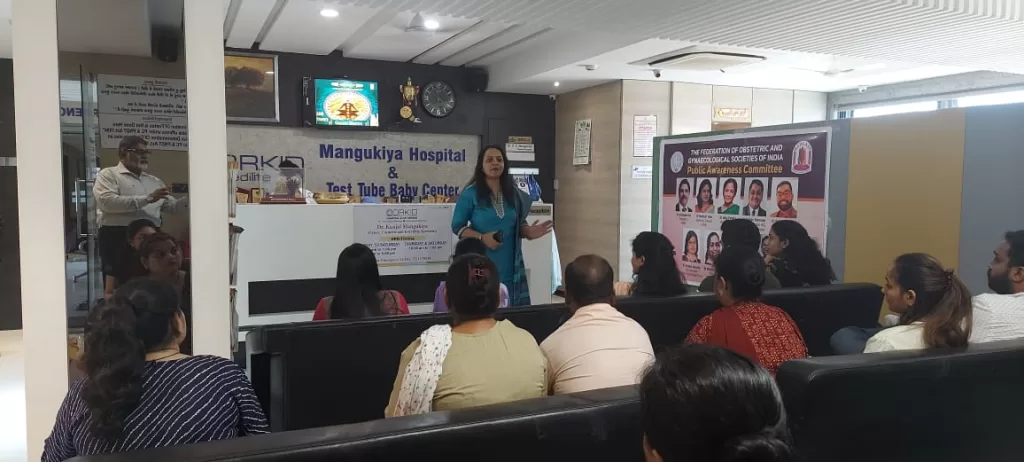Dermoid Cyst
What is a Dermoid Cyst?
A dermoid cyst is a benign (non-cancerous) growth often present from birth, formed when layers of skin and related tissues such as hair follicles, sweat glands, or even teeth become trapped during early fetal development. These cysts grow slowly and can appear under the skin or deeper in the body, such as on the ovaries, head, or neck. Superficial dermoid cysts on the face usually can be removed without complications. Removal of other, more rare dermoid cysts requires special techniques and training.
Talk to Our Specialists – Book Your Screening Appointment Today
Why and How Do Dermoid Cysts Form?
Dermoid cysts originate when pluripotent germ cells capable of developing into various tissues get misplaced during embryonic development. These trapped cells continue to replicate, forming a sac that may include skin, hair, teeth, glands, and fat
Where Do Dermoid Cysts Occur?
- Dermoid cysts in the brain: Dermoid cysts occur very rarely here. A neurosurgeon may need to remove them if they cause problems.
- Dermoid cysts in the nasal sinuses: These are also very rare. Only a handful of cases involving dermoid cysts located here are reported each year. Removal of these cysts is extremely complicated.
- Ovarian dermoid cysts (mature cystic teratoma) : These growths can develop in a woman during their reproductive years. They can cause torsion, infection, rupture, and cancer. These dermoid cysts can be removed with either conventional surgery or laparoscopy (surgery that uses small incisions and specially designed instruments to enter the abdomen or pelvis).
- Dermoid cysts of the spinal cord: A sinus tract, which is a narrow connection from a deep pit in the skin, usually connects these very rare cysts to the skin surface. This type of dermoid cyst can become infected. Removal is often incomplete, but the outcome is usually excellent.
Dermoid Cyst Causes
Dermoid cysts are caused when skin and skin structures become trapped during FETAL DEVELOPMENT. Their cell walls are nearly identical to those of the outer skin and may contain multiple skin structures such as HAIR follicles, sweat glands, and sometimes hair, TEETH, or nerves.
Symptoms to Watch
General Signs
Most dermoid cysts are painless and unnoticed until a medical exam. On the skin, they may appear as firm lumps movable, with a skin-like appearance, and may show a tiny hair or pit
Ovarian Dermoid Cyst
Often without symptoms. When present, symptoms may include:
- Lower abdomen or pelvic discomfort
- A palpable mass that your physician can feel
- Sudden, intense pain if complications arise
Potential Complications:
- Ovarian torsion: When the ovary twists, causing severe pain an emergency.
- Rupture: Rare (~1–2%), but can cause bleeding or infection, requiring immediate care.
- Malignant transformation: Extremely rare (1–2%); risk increases with age, most likely turning into squamous cell carcinoma
Head, Neck, or Other Regions
Depending on location, symptoms may include pressure on adjacent structures, bony erosion, or localised discomfort, especially if untreated. Larger or deep cysts may require imaging (like MRI) to evaluate thoroughly
When to Seek Medical Care
A doctor should be contacted in the following situations:
- A cyst becomes painful or inflamed.
- A cyst grows or changes color.
- Removal is desired for cosmetic reasons.
Typically, removing a dermoid cyst is not an emergency procedure. If a dermoid cyst ruptures, becomes inflamed, or causes pain or fever, a person should seek immediate medical advice. Depending on the severity of pain or discomfort, a person might also consider visiting a hospital’s emergency department.
Exams and Tests for Dermoid Cysts
Prior to removal of superficial dermoid cysts on the face, a person should know the difference between cysts and other facial growths.
- Because dermoid cysts stem from birth and grow slowly, a person usually notices them during childhood or early adulthood.
- Dermoid cysts are firm and painless unless ruptured.
- Dermoid cysts are not attached to the overlying skin.
In rare cases, a dermoid cyst extends into a structure deeper than skin, such as a facial cavity or an orbit. Some doctors recommend a CT scan or other imaging studies for these cases. This decision depends on the doctor’s suspicion of a deep-level cyst and after a determination of risk versus benefit.
Dermoid Cyst Home Remedies
Self-removal of facial cysts at home is not recommended because the cyst will grow back if not completely removed. Chances of infection, bleeding, and other complications increase for people who remove dermoid cysts themselves, especially because the person may not be able to differentiate between a harmless growth and other, more serious skin growths.
Medical Treatment for Dermoid Cysts
To remove a dermoid cyst, the doctor will clean the area over which the cyst is located, inject a local anaesthetic, and make an incision directly over the cyst and attempt to remove it completely.
At the hospital, we assess each case with you in mind:
- Small, asymptomatic cysts may simply be monitored.
- Surgical removal is the most common treatment and is recommended when:
- You experience symptoms (pain, pressure)
- The cyst is large or growing
- There’s a risk of complications or malignancy.
Surgical approach emphasises:
- Complete removal without spillage (to minimise recurrence)
- Minimally invasive techniques (laparoscopy), when possible, especially for ovarian cysts, preserve fertility.
- For deep or complex cysts, or those in delicate areas like near the brain or spine, we tailor the approach with imaging guidance and specialist involvement.
Recovery time varies, but many patients resume normal activities within weeks. Your care team will guide you every step of the way.
Talk to Our Best Gynaecologist
Outlook for Dermoid Cysts
Barring the possible complications associated with any surgery, removal of a dermoid cyst usually results in complete recovery.
FAQS on Dermoid Cysts
Can dermoid cysts be cancerous?
No, they are typically benign. Malignancy is rare and more common in older adults
Can Dermoid Cysts grow back?
Yes, if remnants are left behind after surgery. That’s why complete removal is crucial
Why do they contain teeth or hair?
Because they originate from germ cells that can differentiate into various tissue types. Sometimes that includes skin, hair follicles, glands even teeth
What if I’m pregnant and having Dermoid Cysts?
If your ovarian dermoid cyst is small and asymptomatic, monitoring may be preferred. But larger cysts are often treated surgically during pregnancy if needed for safety
We’re Here for You
Dermoid cysts, whether in the ovary, head, neck, or spine, are almost always benign and highly treatable. Early detection and care ensure the best outcomes with minimal disruption to your life. If you or a loved one needs help understanding or managing a dermoid cyst, our team is ready to support you with empathy and expertise.













